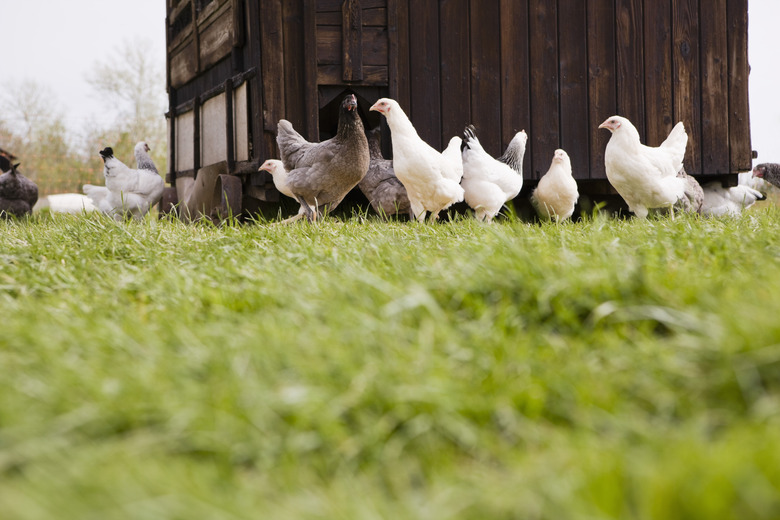Ecological Impact Of Chicken Farming
The annual consumption of chicken meat per capita in the United States more than doubled between 1965 and 2012, going from 33.7 pounds to 81.8 pounds, based on U.S. Department of Agriculture data. With such a rising demand for food that's considered both economical and healthy, chicken farming has expanded. Because factory chicken farming concentrates huge numbers of chickens in small areas, feces and manure production, sick and dead animals, microbial pathogens and feed additives take a toll on the environment. This type of chicken farming contaminates soil and pollutes air and water, affecting both human and animal health.
Fish and Wildlife
Fish and Wildlife
The huge amounts of fecal waste produced by chicken farming, together with feathers, bedding and dead chickens, are difficult to manage in landfills or as compost. Storage of waste or overfertilization of land with chicken manure can cause runoff into rivers, lakes and ponds. Manure contains phosphorus and nitrogen, and runoff that carries these nutrients causes algae blooms in fresh water. Algae blooms reduce sunlight penetration in water, cutting the oxygen supply to underwater plants, a condition known as eutrophication. This leads to fish kills. Heavy metals and pathogenic microbes in chicken waste also harm and cause disease in land wildlife.
Drinking Water
Drinking Water
Runoff from areas with chicken manure and waste contaminate both surface water and groundwater, which are sources of drinking water. Algae blooms can lead to increased growth of the Pfiesteria piscicida microbe, which sickens both animals and humans when present in drinking water. The nitrogen in chicken manure is easily converted to nitrate in water sources for drinking water. Nitrate contamination is more prevalent in groundwater than surface water, according to the Environmental Protection Agency. High levels of nitrate in drinking water causes "blue baby syndrome" (methemoglobinemia) and can be fatal. Conventional water treatment does not remove excess nitrate and requires more expensive special treatment, the EPA reports.
Air
Air
Large chicken farming operations cause odors and emissions of ammonia, hydrogen sulfide and poultry dust, containing bacteria, bacterial toxins and chicken skin debris. Both nearby residents and workers in the poultry industry breathe the polluted air emanating from these chicken farms. Airborne ammonia causes eye and lung irritation. Chicken manure also produces nitrogen oxides, a component of smog. To reduce nitrogen emissions from chicken manure, various countries around the world are considering adding digestion-boosting enzymes to chicken feed, according to BioTimes. Air is also contaminated with harmful microorganisms emanating from chickens used for food production, as reported in the Journal of Infection and Public Health.
Soil
Soil
Chicken manure, especially when worked into the ground, improves soil structure and provides nutrients for plants. But overfertilizing harms plants and can result in contaminated runoff. Chicken manure is also a source of salts, heavy metals, trace antibiotics and hormones. Droppings or manure sometimes contain cecal worm larvae that cause blackhead disease. Earthworms eat the larvae, and wildlife feeding on these earthworms will be sickened and die. Soil can also be a source of other pathogens from disposal of dead chickens or when chicken manure is stored nearby or spread on top of fields. This sickens wildfowl in particular.
Cite This Article
MLA
Blue, Marie-Luise. "Ecological Impact Of Chicken Farming" sciencing.com, https://www.sciencing.com/ecological-impact-chicken-farming-5005/. 24 April 2017.
APA
Blue, Marie-Luise. (2017, April 24). Ecological Impact Of Chicken Farming. sciencing.com. Retrieved from https://www.sciencing.com/ecological-impact-chicken-farming-5005/
Chicago
Blue, Marie-Luise. Ecological Impact Of Chicken Farming last modified March 24, 2022. https://www.sciencing.com/ecological-impact-chicken-farming-5005/
